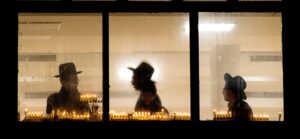So have we reached the end of the line? Do the latest failures and miscalculations — the relentless assault on the al-Shifa Hospital, the fatal airstrike on aid-workers, the targeting of an Iranian General in Damascus, while Hamas’s hostages languish God knows where — mark a turning point in Israel’s relations with the world? Is this the hour when its most understanding allies call time on the killing and even a fervent believer in Israel’s cause, such as I am, begins to waver?
What are we seeing? Are the terrible scenes from Gaza the projections on a bloody screen of one brutal and clumsy man’s baffled obstinacy — the last days of a demented Roman Emperor — or do they show, as anti-Zionists would have it, indeed as anti-Zionists have had it ever since the Jewish longing to return to Zion gave itself a name and the anti-Zionists called it colonialism, that something is rotten in the soul of Israel?
It’s hard right now, if you are a Jew who has always believed the founding of Israel to have been necessary and in many ways miraculous, to hold your nerve. Jews are a contradictory people, at once certain of themselves and faint-hearted. “The Jewish ability to internalise any critical and condemnatory remark and castigate themselves”, said the Israeli novelist Aharon Appelfeld in an interview with Philip Roth, “is one of the marvels of human nature”. We can outface so much criticism and then no more. Will the gathering storm of rage be too much for us this time? Or will we feel obliged to go on salvaging the truth from the noise and cacophony of war, even as those who don’t want to hear us — the libellous, the malevolent, the misinformed and now the usually friendly who are running out of patience — grow in number and in volume?
Some truths aren’t hard to save from the moral fog that fell on southern Israel six months ago, a six months that have been like no other, collapsing a half year into a seeming sleepless day and night, not simply because shock unravels time, but because along with the horror of the massacre itself came the horror of its delighted reception. King Duncan’s horses were said to have eaten one another the night Macbeth had their master murdered. It was nature’s way of telling us that something unfathomably horrible had happened. The cries of “Kill Jews!” that were heard around the world in the aftermath of the murder of more than 1,000 Jews on October 7 exceeded in unfathomable horror the cannibalism of Duncan’s horses. Did we know that humans could openly rejoice in the rape and murder of people they did not know? Isn’t dancing in the blood of others itself a species of cannibalism?
To borrow from Macbeth again, tears were meant to drown the wind. But all we heard was cheering. The Hamas massacre inverted the norms of pity.
And here is another of the truths we save from that most terrible event. That we do our humanity a great wrong when we let theories of power rule our politics and politics rule our hearts. Nothing that Zionism had done or ever could do would justify this glorying in the torture of individual Israelis. That so many of those doing the glorying were, on the face of it, highly educated put paid to our sentimental faith in education as our final and most reliable bulwark against the hysteria of race-hatred. Voice for voice, the educated out-sang the ignorant in bigotry and bloodlust. As did the highly principled out-sing the more ideologically easy-going when it came to such causes as the inviolability of a woman’s body.
Hadn’t the teaching of the past half-century warned against even tentative intrusion into a woman’s space? Yet here, confronted by the grossest intrusion of them all, rape — brutal rape — the same preachers against the most micro of microaggressions refused to voice even the faintest disapprobation. Some, high up in the world’s great universities, wanted to “contextualise” what had happened. Others, wary of falling into that absurdity, asked for more proof, though had any woman other than an Israeli Jew so much as cried foul, they would have been believed because the prevailing ideology holds that to doubt a rape is to violate a woman a second time.
Let’s not beat about the bush — Israeli-Jew hate trumped all other academic considerations. When all was said and done, the great absolutes of the gender-playbook turned out to be contingent and crawled under the desks of the committed like dormice.
In the long sleepless day and night following the massacre, in which Jews of different nationalities and political persuasions, orthodox and unorthodox, tried to make sense of what had happened, the terrible realisation, that “Never Again” meant nothing, dawned. There would never be a “Never Again”. Those we imagined would be our allies — the informed, the progressive, the liberal — were not progressive when it came to us.
Ironically, it was Israel — our bolthole, the country that gave us the stability of self-worth, our old, all-embracing home — that now felt insecure. With uncanny prescience, Hamas understood that to make Jews feel unsafe in Israel was to weaken them in their own and in others’ eyes. More than ever now, it seemed to me, was it imperative to reaffirm the founding necessity of Zionism. The more empowered the lettered illiterate felt to trash Zionism, the more important was it to wrest the story back from them. A great lie had been allowed to prevail for too long. The lie that Israel had no legitimate rights or ties to the Holy Land. The lie that Zionists had stolen it from defenceless Palestinians. The lie that Zionists had turned up not as refugees from the pogroms of eastern Europe but as colonist-settlers hell-bent on getting every Palestinian out.
Is that to say I understand nothing of Palestinian forebodings in those early years as Jews continued to arrive? No. And while I think history bears out good and even utopian intentions on the part of the first Zionists, pioneers who wanted only peace and safety, without doubt there were also those who dealt less than even-handedly with their neighbours. Whether in sufficient quantity to justify Palestinian fears that a takeover was imminent, and that their Holy Places were soon to be over-run, history cannot decide. But, with whatever justification, Palestinians could not let the new arrivals live in peace. There were raids and counter-raids, running battles and massacres. The 1929 massacre by Palestinians of pre-Zionist, scholarly Jews, long resident in Hebron, was not a blueprint for the massacre of nearly 100 years later, but it was, by all official accounts, brutal.
I don’t want to be sentimental about Israel, but it’s enjoyed no peace from the beginning. It is a country that has lived under arms since before its declaration of independence. And on the very day independence was granted it was attacked once more. No, no, and no again. No to Jews. Not here. Not ever. No, no, no.
For Israel to have thrived in the face of a hostility with no end is remarkable. But there can be no denying that the fighting, the conscription of almost all its citizens, the having to live cheek by jowl with a people who cannot and will not accept its presence anywhere “between the river and the sea” has been a toughening, not to say desensitising, experience.
In defence of last year’s massacre, it was argued that it could not be understood independently of the circumstances that led to it. Hamas’s attack, its apologists insisted, was the child of the Israeli occupation. I have always resisted the word “occupation” because it suggests a pre-planned policy, rather than — as I see it — the consequence of all the wars between the two people, most of them instigated by the Palestinians, after which Israel found itself with territory it needed to demilitarise for its own safety. But alright — an occupation it became. After which, what were Palestinians expected to do?
The elusive two-state solution was presented to them several times. Not equitable enough, they said, even when it was the United Nations that had done the divvying up. “Don’t accept,” the cosmopolitan Palestinian writer Edward Said urged from the comfort of his home in North America. “Demand more.” Was he right? Wouldn’t an inequitable divvying up have given Palestinians better if not perfect lives? Well, it’s not for one person to tell another what’s fair. But right or wrong, there was to be no deal.
And so the bloody impasse — a tragedy, as Amos Oz saw it, of two rights. Later, a tragedy of two wrongs. For calling it a tragedy, Oz’s erstwhile Palestinian supporters deserted him. Tragedy meant there was no villain. And the Palestinians needed a villain.
Netanyahu fitted the bill. Netanyahu put his hand out and took. In retaliation for which — though nothing in the history of the two people would ever justify its extreme and twisted violence — the massacre of October 7. But if Israel must take some blame for the massacre, the Palestinians must, by the same token, take some blame for Netanyahu, the lumbering, unsubtle child of unrelenting war, a man hardened in suspicion and fear who does not know the difference between justice and revenge.
To hold out against the Palestinian narrative of dispossession, while allowing that not all of it is fantasy or self-pity, has necessitated, these last few years, more flexibility of mind than dedicated anti-Zionists are willing to try. That’s how we know they are wrong: they do not attempt to understand their enemy and do not cry for him. Did Gazans — educated in their schoolbooks to loathe Jews — dance in the streets on October 7? Whatever the truth, may Israelis never dance the dance of blood.
The heart breaks, seeing the destruction of Gaza. But seeing the destruction of Tel Aviv will hurt no less. Do I fear that? Yes. I sense a change of mood. The constant chanting on the streets of London and elsewhere has, to a degree, contributed to that change. One lie, endlessly retold, can weaken the cause of truth eventually.
But, all on his own, Netanyahu is enough to try the patience of the West whose leaders have little appetite for sticking to a mission. There is a flaw in our natures that leads to our growing bored with even the noblest causes, let alone those grown stale in their own complacency. Oh, what the hell. Enough of them. So those are swastikas. So what? It’s all just a matter of context.
I fear they — papers and commentators and politicians — are losing interest and sympathy at the same rate. They’ve heard it all before. We Jews need to find other ways to make our harrowing history compelling. We’ve tried losing. We’ve tried winning. I’m not sure what’s left.
Disclaimer
Some of the posts we share are controversial and we do not necessarily agree with them in the whole extend. Sometimes we agree with the content or part of it but we do not agree with the narration or language. Nevertheless we find them somehow interesting, valuable and/or informative or we share them, because we strongly believe in freedom of speech, free press and journalism. We strongly encourage you to have a critical approach to all the content, do your own research and analysis to build your own opinion.
We would be glad to have your feedback.
Source: UnHerd Read the original article here: https://unherd.com/



